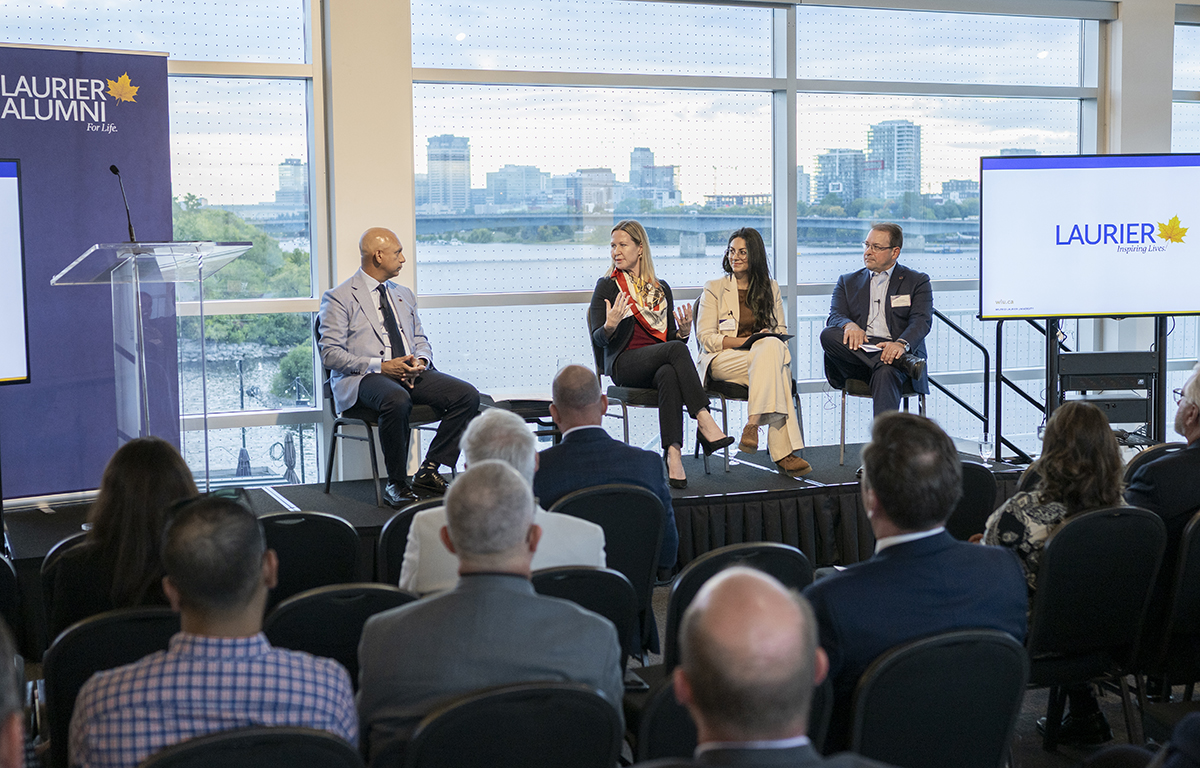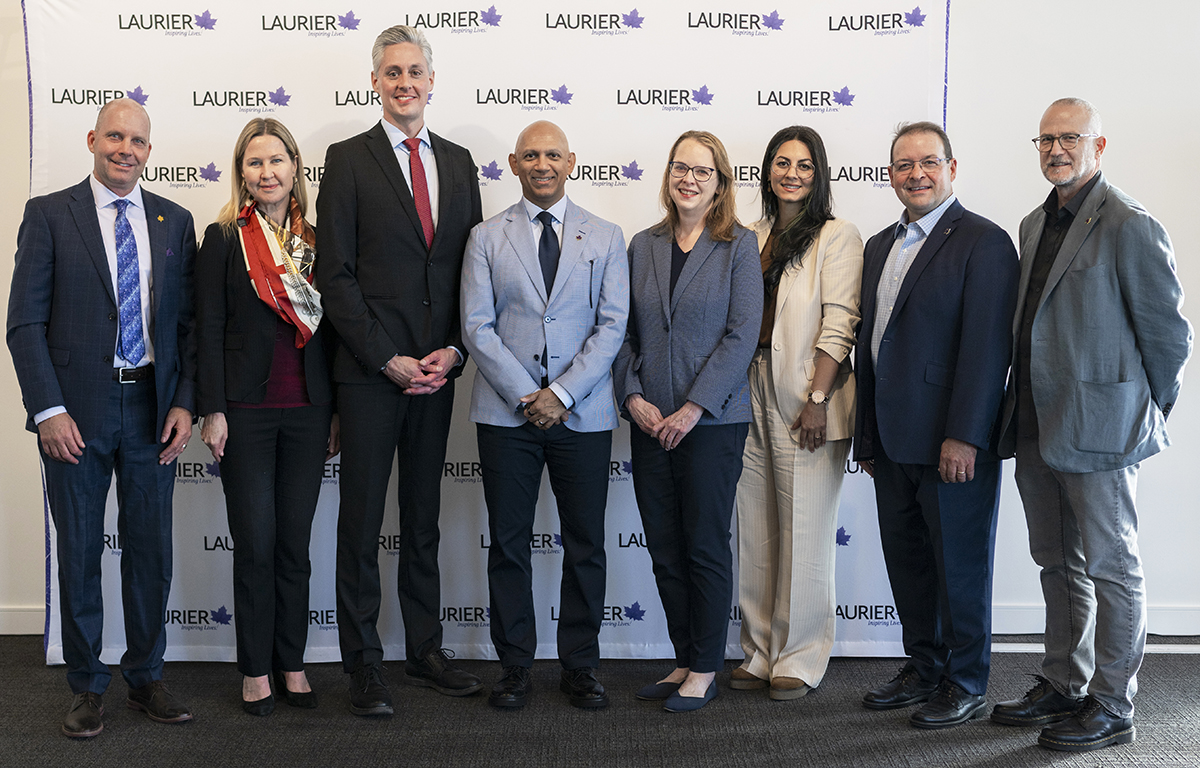We use cookies on this site to enhance your experience.
By selecting “Accept” and continuing to use this website, you consent to the use of cookies.
Search for academic programs, residence, tours and events and more.
Sept. 23, 2025
Print | PDFWilfrid Laurier University brought the North to Canada’s capital on Sept. 18 as alumni, faculty and friends gathered in Ottawa for the third installment of Laurier’s alumni engagement series featuring Chancellor Nadir Patel (BA ’93). The event explored how research, partnerships and global engagement are shaping Canada’s role in the North and strengthening its sovereignty.
The evening opened with remarks from Northwest Territories Premier R.J. Simpson, who emphasized Laurier’s long-standing partnership with the territorial government.
“Since 2010, Laurier has been one of our strongest research partners,” said Simpson. “Laurier’s research spans climate change, permafrost, water systems, wildfires, food security and wildlife – areas that are not just academically interesting, but essential to everyday life in our communities. Northerners are not just participants in this research; they are beneficiaries, collaborators and co-creators of knowledge.”

Laurier Chancellor Nadir Patel, left, leads a conversation focused on the North featuring Ann Fitz-Gerald, Homa Kheyrollah Pour and Joe Dragon.
Simpson’s remarks were followed by a panel discussion moderated by Patel, featuring Laurier experts Joe Dragon, Ann Fitz-Gerald and Homa Kheyrollah Pour.
Fitz-Gerald, professor of international security and director of the Balsillie School of International Affairs, opened the panel with a focus on geopolitics and the North. She emphasized the urgency for Canada to invest in northern infrastructure, development and the critical minerals and metals sector, which she said is key to securing sovereignty in a rapidly shifting global landscape.
“Canada has strong universities and deep knowledge in cyber and infrastructure,” said Fitz-Gerald. “We lack the tools and infrastructure to fully develop critical metals, minerals and other key industries in the North, but we can get there with help from those who do. We need collaboration and policy that’s fit for purpose and a system that can defend the North against other geopolitically destabilizing groups that are already planning expansion in the region.”
Kheyrollah Pour, associate professor of Geography and Environmental Studies, Tier 2 Canada Research Chair in Remote Sensing of Environmental Change and executive director of Laurier’s Cold Regions Research Centre, brought a scientific lens to the discussion. Her research uses statistical modeling and machine learning to examine how climate change impacts ice extent, water quality and critical infrastructure such as ice roads – issues central to the survival and sustainability of northern communities.
“Canada’s sovereignty in the North is not only about borders or geopolitics. It's also about whether Northern communities have the infrastructure, the data and the resources they need to succeed.”
– Homa Kheyrollah Pour
“Canada’s sovereignty in the North is not only about borders or geopolitics,” said Kheyrollah Pour. “It’s also about whether Northern communities have the infrastructure, the data and the resources they need to succeed. Laurier provides a unique opportunity of connecting science with people, place and policy, engaging local communities as well as students and faculty across disciplines to solve the North’s most pressing challenges, and that is exactly what will shape Canada’s future leadership in the Arctic.”
Dragon, senior policy envoy to the Government of Canada for the Government of the Northwest Territories and recipient of the Order of Wilfrid Laurier University, brought decades of public service experience to the panel. A member of the Tthëbátthı́ dënesųłı̨ne from Fort Smith, NWT, Dragon has held senior leadership roles across departments in federal and provincial government, including natural resources, infrastructure, agriculture, human resources and northern development.
Building on Kheyrollah Pour’s remarks, Dragon highlighted the importance of Indigenous knowledge in research and partnerships.
“When we have researchers that come up into our territory, the biggest thing we have to look for is, first of all, relationship and trust,” said Dragon. “I think that Laurier has done a fantastic job at this. This is what allows interaction between Indigenous knowledge and Western science.”
The panel concluded with an audience Q&A featuring Simpson and the panelists, with questions on topics ranging from Indigenous cultural preservation to nation-building projects aimed at enhancing Canada’s security and sovereignty in the North.
Guests continued the conversation during a networking reception, enjoying refreshments and connecting with Laurier leaders, experts and alumni.
“What makes these events so powerful is the opportunity for attendees to engage directly with renowned experts on issues that matter to all Canadians,” said Patel. “Today’s conversations have underscored just how critical the North is to Canada’s future and sparked a renewed commitment to turn shared ideas into action.”

Laurier leaders and dignitaries including Jason Coolman, vice-president: advancement and external relations, left; Professor Ann Fitz-Gerald; Northwest Territories Premier R.J. Simpson; Laurier Chancellor Nadir Patel; President and Vice-Chancellor Deborah MacLatchy; Associate Professor Homa Kheyrollah Pour; Order of Wilfrid Laurier University recipient Joe Dragon; and Jonathan Newman, vice-president: research.